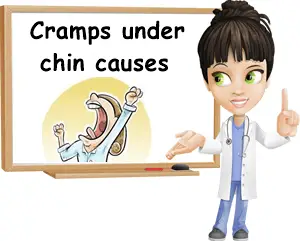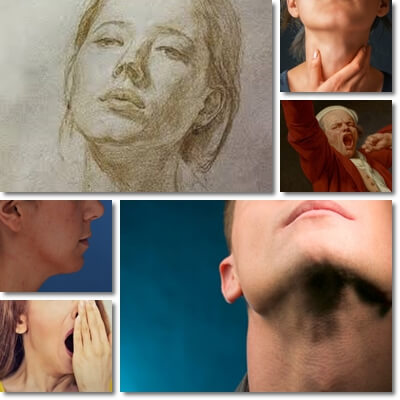Cramps under the chin are essentially muscle cramps or painful spasms of the muscles underneath the chin. The pressure caused by the chin muscles tightening can sometimes result in low to moderately high grade pain for some people. Painful chin cramps are classified as acute. Occasionally, the pain can extend to the neck, jaw or ears and cause the jaw to lock. If the pain starts affecting more than just the area underneath the chin, it is called temporomandibular pain. Chin cramps can be prevented and eased with simple solutions such as massage or applying a source of heat so that the contracted muscles underneath the chin can relax.
What do chin cramps feel like? When you get a chin cramp it feels as if the muscles underneath the chin tighten all of a sudden and become locked in a fixed, unnatural position they cannot return from. You can sometimes feel the base of the tongue rigid due to it also being affected by the contraction. The tightening of the muscles underneath the chin can feel like a lump or knot of hard tissue. If the cramp is left to continue, it can become painful, but quickly massaging the affected muscles can provide an almost complete reduction in pain in as little as 10-15 seconds. As the muscles loosen and the chin cramp goes away, the lump also disappears. It may take several minutes for all the symptoms of a chin cramp to go away.

What happens during a chin cramp? What happens is a contraction occurs in the following muscles: the genioglossus, mylohyoid and/or geniohyoid muscle.
1) The genioglossus muscle. It is a relatively large muscle, divided into the right and left genioglossus and is essentially an external tongue muscle. It controls tongue movements and is singularly responsible for the tongue’s ability to protrude. The genioglossus muscle is located underneath the tongue and spasms affecting it can result in painful chin cramps.
2) The mylohyoid muscle. It consists of a flat, triangle-shaped pair of muscles that sit underneath the genioglossus muscle. The mylohyoid muscle supports the mouth floor and plays an important role in speaking and swallowing food and water.
3) The geniohyoid muscle. The geniohyoid is a neck muscle. It goes from the chin to the hyoid bone or tongue bone, the biggest, visible bone in the upper part of the neck, above the thyroid. This particular muscle helps with respiration and swallowing food and water. Spasms or contraction of this muscle also cause cramps under the chin.
What causes cramps under the chin?
Certain situations make it more likely to us to experience chin cramps.
1) Cramps under chin and yawning. Probably one of the most common causes of chin cramps, or better said triggers, is yawning. Yawning triggers cramps underneath the chin because it involves contracting and raising the tongue muscle quickly as well as requires the participation of all three so-called chin muscles mentioned above. A big yawn in particular or one that comes about quickly or lasts longer can lead to cramps under the chin. The cramps can be all the more painful if we try to stop a yawn by forcing the mouth closed or yawn while with the chin facing downwards.
2) Talking too much. Cramps underneath the chin are more likely to occur after talking for too long without a pause. Such an effort can sometimes put a lot of stress on muscles and result in painful contractions. Talking on the phone for hours at a time or having a job that requires speaking continuously such as teaching, being a singer, talking while playing video games all day can lead to such outcomes.
3) Eating. Taking large bites of food, opening the mouth too wide, eating too fast or eating chewy or hard foods continuously can put strain on the tongue muscles and cause chin cramps. For example, I experienced chin cramps after eating sunflower seeds for several days in a row continuously. A friend of mine had a painful cramp under the chin after opening his mouth too wide to try to take a bite of a large burger.
4) Tilting head forward. Tilting the head forwards doesn’t only cause cervical neck pain or tension in the shoulder blades. It also causes the muscles of the tongue and neck located under the chin area to tighten, stay tense and ultimately contract, resulting in painful cramps. This can happen when you’re playing video games, working on the computer, watching television for too long and can be managed by getting a bigger computer monitor (example: 27 inch monitor) which can be adjusted to your height (raised or lowered) so you don’t have to sit in a tensed, unnatural position and have to suffer cervical neck pain, general back pain and tension or cramps under chin.

What causes painful chin cramps?
The actual causes that lead to muscles under the chin cramping painfully are:
1) Magnesium deficiency. A pronounced magnesium deficiency causes painful cramps and spasms in almost all muscles. Actually, magnesium deficiency is a leading cause of not only chin cramps, but also calf cramps and even shin cramps, eyelid twitching, thigh muscle twitching or throbbing, foot cramps etc.
2) B vitamins deficiency. Next to magnesium, a serious deficiency of any of the 8 essential B vitamins can manifest as muscle spasms, twitching or painful cramps. This is because B vitamins are responsible for protein synthesis, contributing to building muscles as well as help promote the health of the nervous system network that coordinates muscle contractions for movement and various other purposes. Without enough of these vitamins, muscles don’t function properly and spasms and cramps can occur more easily.
3) Potassium deficiency. Potassium is known as an electrolyte and its main function is to maintain fluid balance in the body. And its effects are not restricted to the cardiovascular system. Actually, potassium ensures the medium of communication between the brain, nervous system and all muscles, helping propagate electrical impulses between them. These impulses coordinate muscle contractions directly and a potassium deficiency can result in abnormal muscle contractions such as painful chin cramps.
4) Fatigue. There are two ways fatigue can lead to chin and other cramps: first by depleting our reserves of essential nutrients needed to regulate the activity the nervous system and communication with muscles and, secondly, by over-working muscles through repetitive movements. Sleep deprivation further contributes to such effects and, together with extreme physical tiredness, increases the likelihood of chin cramps.
5) Stress and anxiety. These mark another form of fatigue: mental fatigue. Believe it or not, mental fatigue can be easily brought on by on-going periods of stress and anxiety regarding various aspects of one’s life. Both stress and anxiety not only increase our requirements of essential vitamins and minerals needed for the proper functioning of the nervous system, but also cause nutrient deficiencies that manifest in the most surprising ways, from cramps underneath the chin to difficulty breathing or brain fog.
6) Dehydration. Very often, all sorts of muscle cramps and spasms are caused by dehydration. If you feel thirsty, have a dry mouth or dry, chapped lips, thick saliva or crave watery foods, drink coffee everyday or alcohol, then you need to up your intake of water to prevent dehydration and chin cramps and other painful muscle contractions. Still water is a good choice, but naturally sparkling water which contains electrolytes and minerals (magnesium, potassium, sodium and calcium) is even better for dehydration.
7) Other causes. Although rare, cold and low temperatures felt on the neck, air draft directed at the neck and chin can potentially lead to chin cramps or accentuate muscle cramps and muscle aches in general.
What to do when you have a cramp under the chin?
1) Massage the area underneath the chin. Do so quickly and firmly to help ease the muscle contraction and interrupt the painful cramp. Insist on massaging the cramp away, even though it may be really painful. It will help relieve the pain in a matter of seconds.
2) Apply heat. Remember that this is only useful if you have a source of heat available in that moment and when massaging under the chin does not relieve the contraction. If you are using a infrared lamp regularly and happen to have a chin cramp when at home, direct the warm heat under the chin. In a few minutes the muscles should warm up and start relaxing which should improve the pain. Massaging the chin while applying heat can help even more.
3) Stretch and exercise the muscles. Some people find relief for chin cramps by lifting the chin up, massaging the muscles and then doing some flexing exercises like opening and closing the mouth.
4) Take a magnesium supplement. As soon as the cramp under the chin is over, get yourself some magnesium (150 mg or 300 mg magnesium) to help the muscles recover and prevent further contractions. It helps to also have some potassium too.
5) Drink water. Whether it’s still water you drink with the magnesium or a glass of naturally sparkling water rich in electrolytes and minerals, it should help a lot.
Sometimes, chin cramps when yawning can be felt at the base of the tongue, in which case they are often referred to as tongue cramps. If you feel the muscle contraction affects the tongue rather than the area under the chin, then it is possible it is actually a different medical issue and should be investigated by a doctor. If the pain radiates to the jaw and ear, then it is likely temporomandibular pain, or jaw and ear pain. Again, it is best to see a doctor in this case.
Conclusion
Cramps under the chin are quite common occurrences, almost as common as leg cramps at night or eyelid twitching. Generally, they are harmless and do not produce any long-term side effects. However, like with all things health-related, it always helps to see your doctor for a consultation, even if it’s just to know you are okay. Your doctor will rule out any potentially serious underlying conditions so you can rest easily and just focus on preventing and relieving those painful chin cramps.
